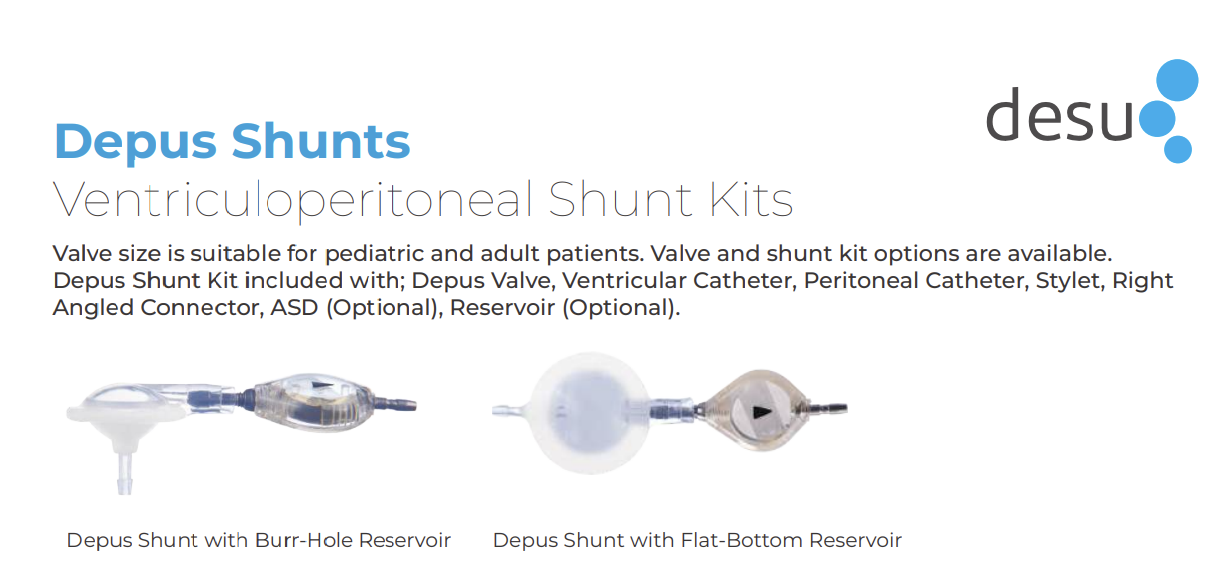Ventriculoperitoneal Shunt Kits
Depus Ventriculoperitoneal Shunt Kits: Complete CSF Diversion Systems for Reliable Hydrocephalus Management
Hydrocephalus and other cerebrospinal fluid (CSF) disorders require precise and durable intervention. One of the most widely used surgical solutions for CSF diversion is the ventriculoperitoneal (VP) shunt, a system that redirects excess fluid from the brain’s ventricles to the peritoneal cavity. Desu’s Depus Ventriculoperitoneal Shunt Kits provide a comprehensive, high-quality solution for neurosurgeons, combining advanced materials, intelligent design, and ease of use in a single sterile package.
Engineered for both pediatric and adult patients, these kits offer unmatched versatility, clinical safety, and performance. Whether you’re dealing with congenital hydrocephalus or post-traumatic CSF buildup, Depus Shunt Kits offer all the tools needed for effective treatment—reducing surgical complexity and improving long-term outcomes.
What’s Inside a Depus VP Shunt Kit?
The Depus Ventriculoperitoneal Shunt Kit is a complete system that includes all necessary components for CSF drainage. Each kit is sterile, ready-to-use, and designed for rapid deployment in operating rooms. The core components include:
- Depus Valve – Available in standard or adjustable configurations. Manufactured using polysulfone for durability and biocompatibility.
- Ventricular Catheter – Inner Diameter: 1.3 mm, Outer Diameter: 2.5 mm, Length: 25 cm. Inserted into the brain’s ventricle to collect CSF.
- Peritoneal Catheter – Inner Diameter: 1.1 mm, Outer Diameter: 2.5 mm, Length: 120 cm. Directs CSF to the abdominal cavity for absorption.
- Right-Angled Connector – For secure tube transition and fluid continuity.
- Stylet – A flexible metal guide for catheter placement.
- Optional Flat-Bottom or Burr-Hole Reservoir – Allows CSF sampling and pressure monitoring.
- Optional Antisiphon Device (ASD) – Helps prevent overdrainage caused by positional changes.
Each component is made from biocompatible materials that resist occlusion, minimize infection risk, and support long-term implantation.
Valve Technology: Precision Where It Matters
The heart of the VP shunt system is the Depus valve, which utilizes a hydrodynamic leverage mechanism to regulate CSF flow. This internal system comprises a ruby ball and titanium spring that work in harmony to control when the valve opens in response to pressure levels. When intracranial pressure exceeds the valve’s threshold, the spring compresses and allows CSF to pass. Once pressure normalizes, the valve closes, ensuring only the required amount of fluid is drained.
Depus valves are available in three pressure variants:
Low Pressure (DP-L-VCK): For gentle drainage in sensitive patients.
Medium Pressure (DP-M-VCK): Suitable for standard hydrocephalus cases.
High Pressure (DP-H-VCK): Designed for severe CSF buildup or increased cranial pressure.
Adjustable models allow surgeons to non-invasively modify the pressure setting post-operatively via magnetic adjustment tools, adding another layer of flexibility.
Semi Antibiotic Options: Infection Control Built-In
Desu also provides Semi Antibiotic Depus VP Shunt Kits, which incorporate antimicrobial components into the catheters. These materials help reduce the risk of bacterial colonization, offering protection especially important in pediatric or immunocompromised patients. Antibiotic-impregnated catheters are proven to lower infection rates, reducing the need for revision surgeries and improving patient outcomes.
Despite the added infection control layer, all mechanical functions remain the same as standard shunt kits—ensuring optimal performance without compromise.
Pediatric and Adult Adaptability
The Depus VP Shunt Kits are offered in both pediatric and adult versions. Pediatric models feature shorter and narrower catheters with lower pressure valves, designed to accommodate the unique anatomical and physiological requirements of infants and children. Adult models are structured to handle larger volumes and longer catheter paths, delivering robust performance across a wider pressure range.
This dual compatibility ensures that the Depus system can support patients across all stages of life.
Benefits for Surgeons and Hospitals
Using a pre-assembled shunt kit offers numerous advantages for medical teams:
Time Efficiency: Eliminates the need to source and assemble components separately.
Error Reduction: Ensures all parts are fully compatible and correctly sized.
Cost-Effectiveness: Simplifies inventory management and surgical preparation.
Sterility: Reduces infection risk by minimizing handling.
Surgeons appreciate the intuitive design and reliable materials, while procurement departments value the all-in-one packaging and Desu’s consistent manufacturing quality.
Optional Enhancements: ASD and Reservoirs
To enhance functionality, Desu offers optional features:
Antisiphon Device (ASD): This add-on prevents overdrainage caused by gravity when a patient moves from lying down to standing. It maintains consistent intracranial pressure regardless of posture.
Reservoirs: Both flat-bottom and burr-hole designs are available, offering secure subcutaneous positioning. They enable CSF sampling and serve as palpation points for diagnostics.
These enhancements improve post-operative care and reduce complication risks.
Frequently Asked Questions (FAQs)
Q1: What is the main purpose of a ventriculoperitoneal (VP) shunt?
A VP shunt is used to treat hydrocephalus by diverting excess cerebrospinal fluid from the brain’s ventricles to the peritoneal cavity, where it can be absorbed. This helps relieve pressure on the brain and prevent damage.
Q2: Who are the ideal candidates for Depus VP Shunt Kits?
Depus VP Shunt Kits are suitable for both pediatric and adult patients suffering from various types of hydrocephalus, including congenital, traumatic, tumor-induced, and idiopathic cases.
Q3: What are the pressure options in Depus Shunt Kits?
Depus valves are available in three pressure ratings:
- Low Pressure
- Medium Pressure
- High Pressure
Surgeons can choose the appropriate level based on diagnostic assessments and patient-specific factors.
Q4: What is the function of the Antisiphon Device (ASD)?
The ASD prevents overdrainage of CSF caused by posture changes, such as standing up. It stabilizes pressure and flow, reducing the risk of complications like subdural hematomas or slit ventricle syndrome.
Q5: How do Semi Antibiotic Kits help reduce infections?
These kits use antibiotic-impregnated catheters that inhibit bacterial growth on the shunt surfaces. This reduces the incidence of infections, particularly in high-risk patients, and can lead to fewer shunt revisions.
Q6: Can I adjust the valve pressure after implantation?
Yes. Depus offers adjustable shunt valves that allow for non-invasive pressure modifications using a magnetic tool. This provides long-term flexibility and adaptability as patient conditions evolve.
Q7: Are the kits pre-assembled and sterile?
Yes. All Depus Ventriculoperitoneal Shunt Kits are pre-packed, sterile, and ready for immediate use in surgical settings, helping reduce preparation time and minimize contamination risk.
Depus Ventriculoperitoneal Shunt Kits by Desu combine innovation, clinical efficiency, and safety into one of the most reliable hydrocephalus management systems available today. With both standard and semi-antibiotic options, fixed and adjustable valves, and full pediatric/adult compatibility, these kits are trusted by neurosurgeons across the globe. Whether you’re seeking performance, adaptability, or surgical convenience, Desu delivers a solution you can rely on.
For advanced CSF diversion with built-in safety, flexibility, and precision—choose Depus, choose excellence.
Why Choose Desu?
When it comes to bone regeneration, Desu is trusted by healthcare providers worldwide. Here’s why orthopedists rely on our Bone Grafts to deliver superior results:
- Exceptional Biocompatibility: Materials designed to integrate with natural tissue for optimal safety and performance.
- Osteoconductive Excellence: Advanced properties that foster predictable and reliable bone healing.
- Versatile Applications: Compatibility with a wide range of surgical scenarios.
- Ease of Use: Tailored designs for seamless application and handling in the operating room.
- Comprehensive Guidance and Support: Our experts provide training, product insights, and ongoing resources to ensure your success.
At Desu, innovation and quality go hand in hand. We’re proud to create solutions that address the critical challenges in bone regeneration while improving the quality of life for patients worldwide.
Contact Us
Elevate the care you provide with Desu’s Bone Grafts. Together, we can help transform the way bone regeneration and healing are approached in orthopedic practice.
Join the many surgeons who trust Desu’s Bone Grafts.
- Request a demo to explore their superior properties firsthand.
- Contact our product specialists for detailed specifications and tailored recommendations.
- Learn how our solutions can support your surgical goals through cutting-edge research and expertise.
With Desu’s Bone Grafts, you’re equipped to unlock new possibilities in orthopedic care. Together, we can deliver exceptional outcomes for your patients and redefine what’s possible in bone regeneration.

